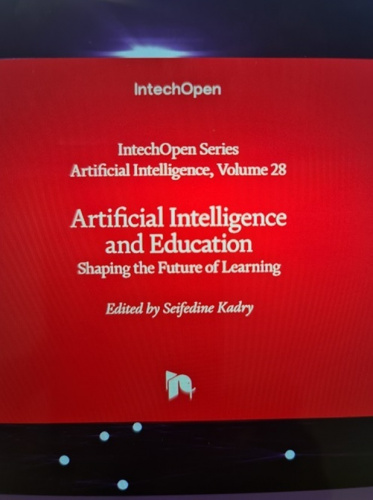BOOK PUBLISHED:
Artificial Intelligence and Education: Shaping the Future of Learning
By: Prof. Esmail Zarei Zavaraki, Faculty Member

Book Chapter by Professor Esmaeil Zaraii Zavaraki
The document discusses the role of artificial intelligence (AI) in special education, particularly in teaching and learning processes for individuals with special educational needs. It emphasizes the significant progress and advancements in AI, especially in the field of education, and the use of assistive technologies to provide access to educational content for individuals with special needs. The document highlights the various applications of AI in education, such as advanced web search engines, recommendation systems, understanding human speech, generative tools, and more. It also explores the potential impact of AI on achieving sustainable development goals, especially in promoting inclusive and equitable quality education.
Furthermore, the document delves into the opportunities for AI to advance inclusion and equity in education, emphasizing the need for the application of AI technologies to improve education for vulnerable groups, including students with special educational needs. It also discusses the use of AI-based assistive technologies, such as speech recognition software, text-to-speech software, virtual assistants, adaptive learning software, and more, to enhance access and interaction with educational content for individuals with special needs. Additionally, it mentions the potential of emerging technologies like Metaverse technology in improving the teaching and learning process, especially for individuals with special educational needs.
Moreover, the document introduces the blended learning approach and its conceptual and procedural models, emphasizing the systematic integration of online and face-to-face engagement to support meaningful interaction between students, teachers, and resources. It also provides case studies that validate the effectiveness of various instructional models and technologies, such as mobile phone learning patterns for visually impaired students, instructional patterns enriched by virtual social networks for students with hearing impairment, and educational models based on assistive technology for students with physical-motor impairment, among others.
In conclusion, the document highlights the crucial role of AI and emerging technologies in shaping the future of special education, emphasizing the need for further research and exploration to leverage these technologies effectively in improving the teaching and learning process for individuals with special educational needs. It also underscores the significance of innovative strategies and educational models to support students with special needs and promote inclusive and equitable quality education.
The document discusses the significant progress and advancements in artificial intelligence (AI) in the field of special education, particularly in teaching and learning processes for individuals with special educational needs. It emphasizes the use of AI-based assistive technologies to provide access to educational content for individuals with special needs. The document also introduces the blended learning approach and its conceptual and procedural models, highlighting its potential to improve the teaching and learning process for individuals with special educational needs.
Key quotes from the document include:
1. "Artificial intelligence have very high capacities and capabilities in special education and have been strengthened and upgraded compared to the past. Especially in the field of education, teaching and learning, remarkable progress has happened and is happening."
2. "There are examples of AI-based assistive technology that can help people with special educational needs access and interact with educational content."
3. "In this chapter of the book, the opportunities and capabilities of artificial intelligence for people with special educational needs, particularly in teaching and learning process, have been introduced and analyzed."
4. "The types of assistive technologies based on artificial intelligence for disabled people have been explained."
In conclusion, the document emphasizes the need for further research and exploration to leverage AI technologies effectively in improving the teaching and learning process for individuals with special educational needs. It also underscores the significance of innovative strategies and educational models to support students with special needs and promote inclusive and equitable quality education.
The paper contributes to the understanding of the capacities and capabilities of artificial intelligence (AI) in education, particularly in the context of special education. It highlights the common uses of AI in the education process, teaching, and learning for individuals with special educational needs. Additionally, the paper introduces various assistive technologies based on AI in special education and emphasizes the importance of the blended learning approach and related models in the education process. The author and their research team also discuss case studies and ongoing research in the field of AI and its applications in special education, underscoring the need for further national and international research to explore this emerging technology.
The document also presents several research studies that focus on designing and validating educational models and programs using AI and technology to enhance the learning and academic achievement of students with various disabilities, such as math learning disorder, high-functioning autism spectrum disorder, physical-motor impairments, and hearing impairment. These studies provide insights into the effectiveness of AI-based educational interventions and their impact on students' learning, social skills, academic achievement motivation, and problem-solving skills.
Furthermore, the paper acknowledges the need for innovative strategies and educational models to support students with special needs and promotes inclusive and equitable quality education. It also emphasizes the importance of collaborative efforts involving students, teachers, parents, and experts to advance knowledge in the field of artificial intelligence technology for special education.
In summary, the paper contributes new knowledge by shedding light on the potential of AI and technology-based educational interventions to improve the learning outcomes and educational experiences of individuals with special educational needs, as well as the need for further research and exploration in this area.


